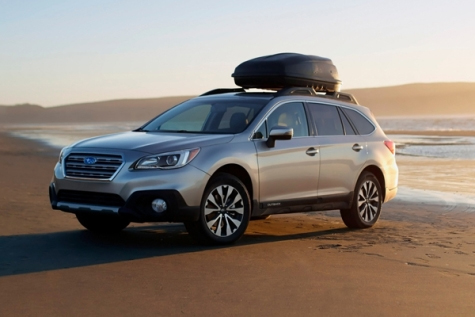A Subaru battery drain lawsuit settlement has been reached between the automaker and plaintiffs following multiple class actions that were filed since 2020.
According to the 13 customers who filed the battery drain lawsuit, defects in these vehicles cause the batteries to drain, then the replacement batteries also drain.
- 2015-2020 Subaru Outback
- 2015-2020 Subaru Forester
- 2015-2020 Subaru Legacy
- 2015-2020 Subaru WRX
- 2019-2020 Subaru Ascent
The class action alleges a Subaru battery drains because of the controller area network (CAN), which relies on electrical current when the vehicle is in use. But when the vehicle is shut down, the CAN system should enter sleep mode so only a limited amount of electrical current is used.
According to the Subaru battery drain lawsuit, software errors prevent the CAN from entering sleep mode when the vehicle is turned off. This will drain the original battery and every replacement battery installed in the Subaru.
The lawsuit alleges Subaru drivers and their occupants are left stranded once the batteries drain and fail.
The plaintiffs filed the lawsuit by alleging Subaru should stop selling the vehicles and replace or buy back the vehicles.
Multiple lawsuits were filed concerning the alleged Subaru battery drain problems, including Dalen v. Subaru and Tomasian v. Subaru.
Subaru insists there is nothing wrong with the vehicles and the automaker denies all allegations in the class action lawsuit. Additionally, Subaru says the vehicles, "function properly, are not defective and that no warranties or statutes have been breached."
Subaru Battery Drain Lawsuit Settlement Agreement
According to the proposed battery drain settlement, Subaru will pay 100% of the cost for a first battery replacement for up to five years or 60,000 miles from the in-service date of the vehicle.
For vehicles that have been in service more than five years or 60,000 miles, Subaru will extend its warranty for three months from the class action lawsuit notice date, but this will cover only 50% of the first battery replacement cost.
Subaru Battery Replacement
The Subaru battery drain lawsuit argues replacing the batteries does no good because the replacements also drain, but some owners may be helped by an extended warranty in situations where the replacement batteries fail.
However, considering some of the models go back to the year 2015, some customers may still have to pay a percentage for a battery replacement.
- If a vehicle has been in service up to five years or 60,000 miles (whichever comes first), 100% of the battery replacement costs will be paid, including parts and labor.
- If a vehicle has been in service up to seven years or 84,000 miles (whichever comes first), 80% of the battery replacement costs will be paid, including parts and labor.
- If a vehicle has been in service up to eight years or 100,000 miles (whichever comes first), 60% of the battery replacement costs will be paid, including parts and labor.
Reimbursement for Battery Drain Expenses
According to the Subaru battery drain lawsuit settlement, customers may be reimbursed over and above the amounts they paid for expenses related to the alleged Subaru defect.
Examples of expenses eligible for reimbursement include battery replacements and/or battery testing and diagnosis performed by a Subaru dealer, and out-of-pocket expenses for towing services.
For a customer who had their vehicle serviced at a third-party repair facility and who paid for any battery replacements and/or battery testing and diagnosis or expenses for towing services, reimbursement is possible.
However, before the vehicle was repaired at a third-party shop, the customer must have "presented his or her vehicle to an authorized Subaru dealership or contacted Subaru’s customer service division regarding the battery-related issue."
With a vehicle that experienced two or more Subaru battery failures within five years/60,000 miles from its in-service date, Subaru will provide "140% of Reasonably Related Reimbursable Costs related to the Class Member being stranded as a result of a battery failure that occurred prior to the Notice Date."
According to the Subaru battery drain lawsuit settlement:
"Recoverable expenses include, without limitation, hotel expenses, meals and equipment purchased to sustain battery operation, and other expenses reasonably related to the battery failure. A Settlement Class Member who qualifies for the cash payments under this section will also be entitled to receive a $140 single-use Subaru service voucher, which will remain valid for one year from the date the claim is approved."
Subaru Battery Drain Software Update
The battery drain settlement, which still needs to be granted final approval, provides customers with a free software update at a dealer. However, free software updates (11-174-17R and 11-176-17) were already available for certain vehicles years before the Subaru battery drain lawsuit was filed.
The update allegedly improves the engine control module charging logic of the Subaru battery. Subaru customers who paid for the battery drain software updates are eligible to be reimbursed 100%.
Based on the settlement agreement, each of the 13 named plaintiffs will receive $4,000, and the attorneys who represented those owners will receive more than $4 million.
The Subaru battery drain lawsuit was filed in the U.S. District Court for the District of New Jersey: In re: Subaru Battery Drain Products Liability Litigation.
The plaintiffs are represented by Mazie Slater Katz & Freeman, LLC, Sauder Schelkopf LLC and Girard Sharp LLP.









